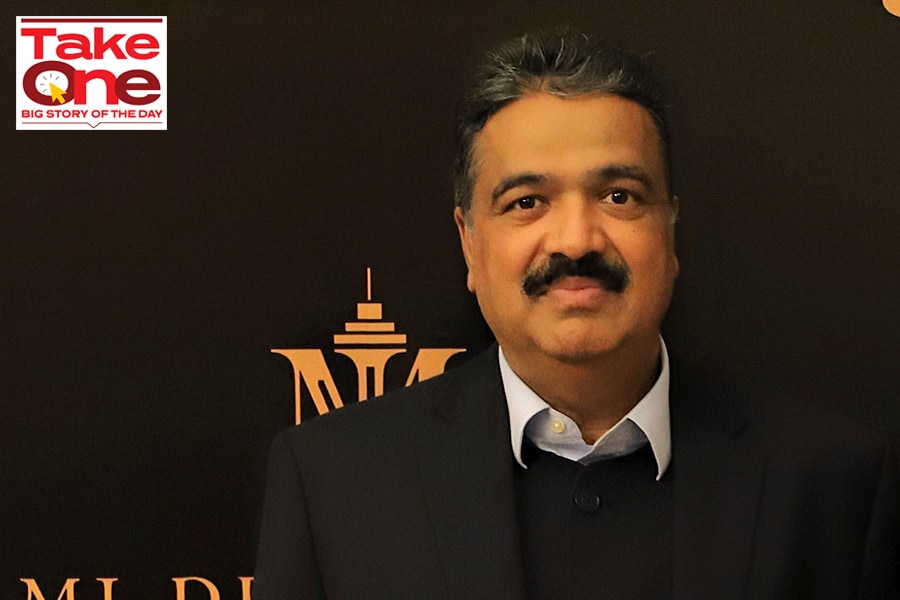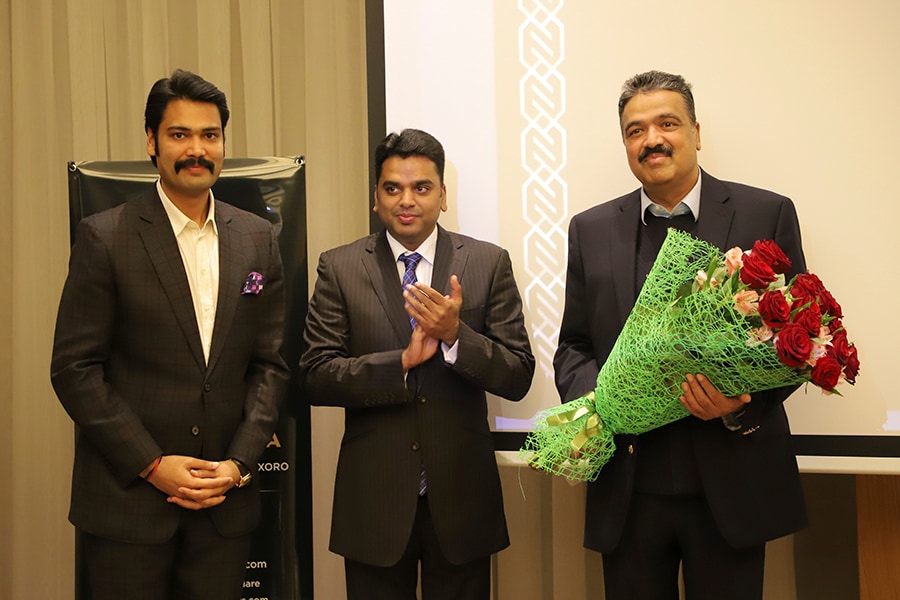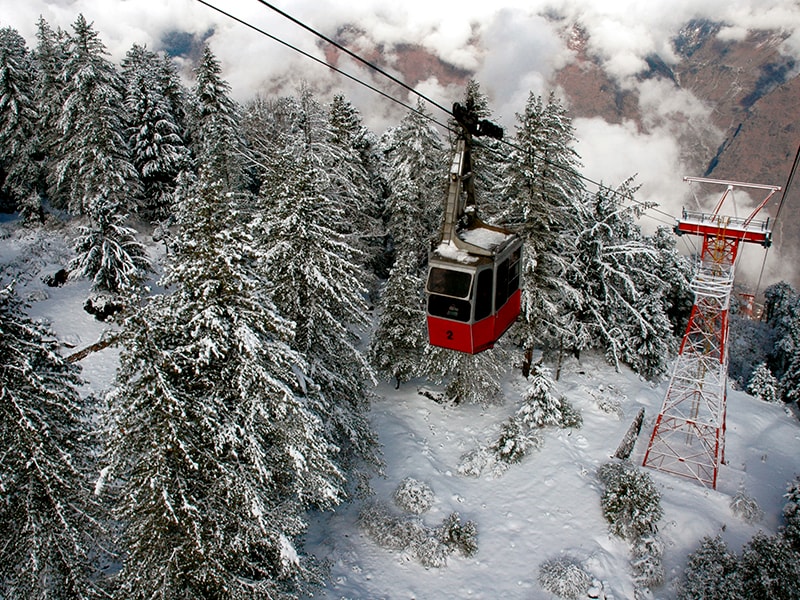“The resolution plan submitted by Murari Lal Jalan and Florian Fritsch has been duly approved by the CoC (committee of creditors) as the successful resolution plan,” Ashish Chhawchharia, the resolution professional appointed by the lenders of the airline, said in a stock exchange filing on October 17. The consortium will now have to wait for clearance from the National Company Law Tribunal (NCLT) before the new owners can officially take over the reins. In July last year, the NCLT had approved bankruptcy proceedings against Jet.
While Kalrock Capital is part of the Fritsch Group, an investment group founded by serial real estate and tech entrepreneur Florian Fritsch, 56-year-old Murari Lal Jalan remains a mystery. A casual search on Jalan on the internet is almost certain to land one on the website of a commercial and residential project being developed in Uzbekistan by the MJ Group, which envisages Jalan as “a man who has a global vision”. MJ Group, as the initials suggest, is owned by Jalan.
“Traditional wisdom says ‘don’t put all your eggs in one basket’ and it perfectly applies on Mr Murari Lal Jalan,” says his profile on the website of Namangan Square, a residential complex being developed by the group in Uzbekistan’s eastern city of Namangan. The complex is spread over 18 hectares, featuring 1,500-odd luxury apartments.
“An eminent figure in the business fraternity, Jalan is a veteran who has invested in diverse sectors like real estate, mining, trading, construction, fast-moving consumer goods, dairy, travel and tourism, and industrial works globally to name a few, minimising the risk factor,” the website adds.
But Namangan Square is only the tip of the iceberg when it comes to Jalan’s empire. Besides that, MJ Group is developing three other real estate projects in Uzbekistan, including a five-star hotel, and has sought permissions to set up Minerva City, something the group calls a “city within a city”. The complex will have schools, colleges, and a university over some 100 hectares, with around 15,000 apartments, hotels, and shopping centres, costing over $500 million.
On September 17, the group laid the foundation stone for the construction of the Minerva World of Knowledge International University in the Sergeli district of Tashkent. It plans to start the academic year in September 2021.
“MJ Developers is the world-renowned firm with over 15 years of real estate experience,” the company says on its website. “Its headquarters is in Dubai and company executives got business experience in diverse industries spanning over 40 years in a range of countries including India, Russia, Brazil, UAE, and now Uzbekistan.”
Shadow figure
Despite his newfound success in Uzbekistan, within the UAE, where a bulk of his business seems to have been based out of, business leaders say Jalan remains relatively unknown or low profile. “I don’t know him and hadn’t heard of him,” BR Shetty, the former co-chairman of Abu Dhabi based NMC Health, who has been embroiled in a financial controversy in the UAE, told Forbes India over the telephone. “However, I congratulate the group for having come forward to revive the sinking company which can be successful. There is a massive opportunity in the aviation space, and it takes a lot of guts as well as patriotism to pursue this.”
Jalan is the chairman of Agio Image, a UAE-based firm that claims to have started with the distribution of photographic products in the early 1990s. “The group is today also involved in trading, construction & real estate and medical services,” the company says on its website.
“I have never heard of him,” says Mark Martin, founder of Dubai-based aviation consultancy Martin Consulting, and a former project director at Eastern SkyJets Dubai. “The business circle here is very small, and everybody knows everybody. But there has never been a mention of him. It doesn’t add up.”
![bg_img_e6017 bg_img_e6017]() Aakash Jahajgariah, who is married to Vega Gupta, the niece of the South Africa based Gupta brothers, along with Ankit Jalan and Murari Lal Jalan
Aakash Jahajgariah, who is married to Vega Gupta, the niece of the South Africa based Gupta brothers, along with Ankit Jalan and Murari Lal Jalan
Image: NRI Achievers
“He seems like a very low-profile businessman,” says a senior business executive at one of the UAE’s biggest companies. “He is unknown within the circles here, and we are all trying to find out about him.”
But back home, in Ranchi, Jalan and his family don a different image. The family owns charitable trusts, a school, cinemas, and is among one of the best-known Marwari business families in the city. “He comes from the same community as I do,” a Ranchi-based businessman said on condition of anonymity. “We know them quite well. They are rich, but certainly not rich enough to buy Jet Airways.”
Murari Lal’s brother, Narayan Jalan, is currently the chairman of Bridgeford school, a prominent school in the city, and also runs the GP Jalan Memorial School, a school for the underprivileged, named after his father Ganesh Prasad Jalan. The senior Jalan had been engaged in the paper trading business before passing away in 1984. Murari Lal dabbled with the business for some time before foraying into the distribution of photographic equipment and setting up numerous photo labs in the city and outside. Murari"s other brother, Vishal, stays with him in Dubai.
In the early 1990s, as with many Indian businesses that ventured into the former Soviet Union that was fast collapsing, Murari Lal went to St Petersburg to set up a chain of labs across Russia. Around the same time, Japanese conglomerate Konica, which was looking for a reliable partner in the country, entrusted him with the distribution of their entire range of photographic products in Russia and The Commonwealth of Independent States (CIS) countries.
Since that break, Murari Lal steadily expanded his business to Brazil, acquired Kolkata-based Kanoi Paper and Industries and renamed it to Agio Paper & Industries, and set up Orion IT Private limited that owns Orion Techcity, a special economic zone (SEZ) spread over 155 acres in Kolkata. The stone-laying ceremony of the SEZ in 2008 was attended by the former President of India, Pranab Mukherjee, in his capacity as the foreign minister, and then West Bengal Chief Minister Buddhadeb Bhattacharjee. The project is currently pending statutory approvals from the West Bengal government.
In the UAE, meanwhile, Jalan reportedly forayed into the real estate business, constructing over one million square feet of land that was later leased out to companies. He also built labour camps for workers in the port town of Jebel Ali. The Agio Image group handles the distribution and sales of photographic and consumer products of companies including Sony, Konica Minolta, and Panasonic. Apart from that, the group’s arms include a business that’s engaged in trading and construction machinery.
The South Africa connection
Last year, however, Jalan’s family was in the eye of a storm when his niece married into the controversial South Africa-based Gupta family. The Gupta family, comprising brothers, Ajay, Atul, and Rajesh were among the richest families in the African nation with businesses spanning uranium, gold and coal mines, hospitality, engineering, IT, and media before they were forced to flee in 2016 over corruption charges.
The brothers who migrated from Saharanpur in Uttar Pradesh had built up enormous political and economic influence in South Africa and were seemingly close to Jacob Zuma, the former president. The relationship had allegedly helped the Guptas secure large government contracts. In 2013, the Zuma presidency came under criticism after the brothers used a secure air force base to land their private aircraft. Since then, they had been at the centre of a scandal that brought down Zuma.
In early 2019, Atul’s son Shashank married Murari’s niece and Vishal Jalan’s daughter in a wedding held at the picturesque hill station of Auli. The wedding was attended by Uttarakhand Chief Minister Trivendra Singh Rawat, yoga guru Baba Ramdev, and celebrities including Katrina Kaif, Badshah, and Kailash Kher. Soon after, however, the Guptas faced flak for causing environmental damage after leaving behind 240 quintals (24,000 kg) of garbage after the four-day celebrations.![auli auli]() Ropeway in Auli, a small ski resort near Joshimath in the Himalayan state of Uttarakhand in Northern India.
Ropeway in Auli, a small ski resort near Joshimath in the Himalayan state of Uttarakhand in Northern India.
Image: Rajeev Sachdeva/IndiaPictures/Universal Images Group via Getty Images[br]Around the same time, Jalan partnered with Kamal Singhala, Ajay Gupta’s son, and Saharanpur-based Anil Kumar Gupta to set up Patanjali India Distribution Limited, according to documents with India’s ministry of corporate affairs. Among others, the Delhi-based company’s articles of association state the company will be engaged in trading, import, export, retail, distribution, and marketing of milk products, instant foods, health foods, and agro foods. Alongside, it also plans to carry on the activities of trading, import, export, retail, distribution and marketing of pharmaceutical and herbal medicines, ayurvedic cosmetic items, herbal cosmetics, and shampoo, among many others.
It isn’t entirely clear if Patanjali India Distribution is linked to the Baba Ramdev-promoted Patanjali Ayurved, although Jalan is a follower of the Yoga Guru. Questions sent to Patanjali have yet to receive any response. A detailed questionnaire sent to Jalan is also yet to be responded to.
"He holds a nominal stake of 0.1 percent in the company," a person close to Jalan said on conditions of anonymity. "However, the company never got off the grounds as its bank accounts have not yet been opened and has not been capitalised till date. The family relationship of Mr Jalan’s brother and his family has no relation to the business activities of Mr Jalan. Mr Jalan and his brother are two separate entities and their personal relationships have no connection with their business activities, which are separate and distinct."
That"s something Madnani of Kalrock reiterates. “We have no links with the Patanjali group, which is Baba Ramdev’s,” says Manoj Madnani, a board member at Kalrock Capital. “The consortium consists of only two members—Jalan and Fritsch, and the entire investments will be made between these two only. Jalan has no business ties with any of the Gupta family. Nobody from the Gupta family is involved directly and indirectly in the business."
Yet, industry insiders say there could be more than what meets the eye. “The Gupta family has had some tryst with aviation and owns the New Delhi-based Heritage Aviation, an airline company that owns helicopters and a business jet and mostly undertakes pilgrimage trips,” says Martin of Martin Consulting. “They mostly undertake trips to the Himalayas, including Vaishno Devi.”
According to the ministry of corporate affairs, Angoori Devi Gupta, a South African national, owns over 68 percent of Heritage Aviation. Angoori Devi is also the mother of the Gupta brothers.
“With the new set of buyers, you never really know what’s going on,” another industry executive says. “If you wanted to start an airline, why did you wait this long? I won’t be surprised if Kalrock could be the front end of a deal.” A spokesperson on behalf of Murari Lal Jalan has clarified that he "has no business association or ties with Gupta brothers of South Africa and it is absolutely incorrect to link him to them or to any of their businesses."
“What we bring to the table is corporate governance and compliance, and Jalan was the one who came up with this entire idea,” adds Madnani. “He (Jalan) sensed the opportunity and he said this is a sector, once it rebounds, will have a huge opportunity.” While Jalan and Kalrock have had a relationship early on, a decision to jointly bid for the airline, Madnani says, was taken around the time the pandemic had begun to sweep across the world. “This is as opportunistic as it gets,” Madnani adds.
The joy of flying, once again
The new owners of Jet Airways come in at a time when three previous rounds to invite expression of interest had failed to evoke any response.
The fourth round seeking suitors was issued in May 2020, with a deadline of July 21. The prospective applicants, particularly consortiums, required a lead consortium member with the single-largest equity participation. Besides, the consortium also needed to have funds available in excess of Rs 500 crore.
A consortium comprising Abu Dhabi’s Imperial Capital Investments, Haryana-based Flight Simulation Technique Centre, and Mumbai’s Big Charter was also in the final race. Kalrock reportedly offered Rs 866 crore while Imperial Capital Investments’ bid was around Rs 770 crore.
Madnani, a board member at Kalrock along with the director John Oram, had previously led and managed deals at Kulczyk Investments, an investment firm founded by Polish entrepreneur Jan Kulczyk in 2007, focusing on business opportunities in high growth markets. “My history has been in turning around business,” Madnani says. “We have done a lot of turnarounds in the steel sector and oil and gas. John and I used to be part of the team that managed the family office of Jan Kulczyk. For us, human capital and brand value mean everything.”
For now, Kalrock Capital says the company is complying with the ownership structure prescribed by the Indian government which requires the local partner (Jalan) to have a majority stake. It is also carefully navigating through all the regulatory hurdles, before laying plans to kickstart operations at Jet. “We want to get to a full-service airline, we want international routes, domestic routes, and we have a phased plan,” says Madnani. “We have to go through the regulatory process.” The company is also planning to operate on all the slots that Jet Airways enjoyed previously.
But staging a comeback may not be easy. “Given the market realities, India needs one less airline, not one more,” says Satyendra Pandey, former head of strategy for GoAir and currently a partner at the advisory firm AT-TV. “Past experience has demonstrated that a team with on-ground knowledge, localised access and an ability to think in terms of investment returns is critical. Whether the bidder can round up such a team will be a test in itself.”
Others agree that the current market situation, particularly in the aviation sector, is rather grim. “Private equities are looking at at least 20 percent return on their investments,” says an industry executive. “To drive those returns, you need debt. Nobody is willing to lend to airline companies now. Jet also will need big money, mostly millions of dollars, to get itself to fly again. It may not be easy.”
Liechtenstein-based Fritsch, the founder of Kalrock, is a self-confessed conscious capitalist and started as a paramedic in Red Cross. “From Tesla, Relayr and Delivery Hero, Florian focuses on investments that embrace technology to accelerate their impact in a sustainable manner,” Fritsch’s profile on LinkedIn says.
“When we looked at this situation and saw the value of this brand, we were overwhelmed by the love people had for the brand,” adds Madnani. It also helped that India continues to be one of the most promising aviation markets despite a pandemic-induced slowdown in the sector. The country has already firmed up plans to allow domestic airlines to increase their operations to 75 percent of their capacity. In September, according to rating agency ICRA, the domestic passenger traffic stood at 3.9 million, as against 2.8 million in August 2020, indicating a 37 percent growth.
However, Pandey of AT-TV sounds a note of caution. “Current financing avenues for airlines are few and far between. There is little certainty on debt service coverage, creditworthiness, and collateral. The new Jet will have to navigate through all of this.”
But Madnani doesn’t seem worried. “The three words we look at—adaptability, flexibility, and optionality—fitted well in this situation. India is a country of 1.3 billion people with a phenomenal opportunity for tourism. Then, there is also the opportunity in air cargo. We are working with everyone to hit the ground running,” he says.
Only time will tell if the mysterious Murari Lal Jalan, and Kalrock Capital, will have what it takes.
The story has been updated on the basis of additional reporting

 Murali Lal Jalan, set to become the newest owner of Jet Airways, along with Kalrock Capital. Photo courtesy: NRI Achievers
Murali Lal Jalan, set to become the newest owner of Jet Airways, along with Kalrock Capital. Photo courtesy: NRI Achievers Aakash Jahajgariah, who is married to Vega Gupta, the niece of the South Africa based Gupta brothers, along with Ankit Jalan and Murari Lal Jalan
Aakash Jahajgariah, who is married to Vega Gupta, the niece of the South Africa based Gupta brothers, along with Ankit Jalan and Murari Lal Jalan Ropeway in Auli, a small ski resort near Joshimath in the Himalayan state of Uttarakhand in Northern India.
Ropeway in Auli, a small ski resort near Joshimath in the Himalayan state of Uttarakhand in Northern India.